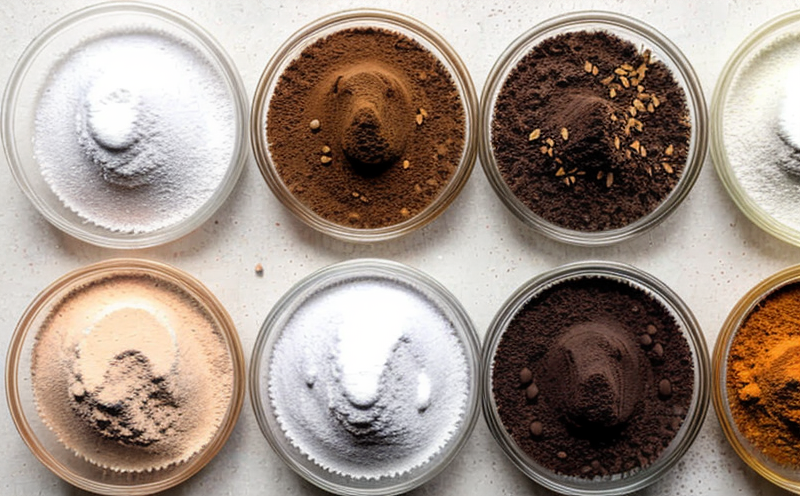EN 17803 Sunset Yellow Screening in Snacks
The European Standard EN 17803 provides a method for the screening of Sunset Yellow (E110) in various food and feed matrices, including snacks. This test is particularly important as it helps ensure compliance with regulatory limits set by authorities like the European Commission to protect public health.
Sunset Yellow is a widely used azo dye that adds color to a range of products such as sweets, beverages, and snacks. Its use in food and feed must be regulated due to potential allergenic effects and its stability under various conditions. This screening test ensures that the levels of Sunset Yellow comply with EU regulations.
The method involves extracting Sunset Yellow from the snack sample using an appropriate solvent followed by a colorimetric determination of the dye. The extracted dye is then quantified against a standard curve prepared from known concentrations of Sunset Yellow. Accuracy in this process is crucial as even small deviations can lead to non-compliance issues.
The test procedure outlined in EN 17803 ensures that the results are reliable and consistent, making it an essential tool for quality managers, compliance officers, R&D engineers, and procurement specialists working with food and feed products. The standard is recognized by major regulatory bodies, ensuring confidence in the accuracy of the test results.
Proper sample preparation is critical to obtaining accurate results. This includes ensuring that the snack matrix is representative of the product being tested. The extraction process must be optimized to ensure that all instances of Sunset Yellow are captured without interference from other compounds present in the snack. Calibration and standardization steps should also be meticulously followed to provide a reliable baseline for comparison.
The instrumentation used for this test typically includes colorimeters or spectrophotometers capable of measuring absorbance at specific wavelengths corresponding to the absorption spectrum of Sunset Yellow. Modern equipment allows for automated sample handling, enhancing both accuracy and efficiency in testing.
Interpretation of results is straightforward; if the measured concentration exceeds the allowable limit specified by EU regulations, corrective actions must be taken. This might involve adjusting production processes or sourcing alternative ingredients to ensure compliance with legal limits on Sunset Yellow content.
In conclusion, adhering to EN 17803 not only ensures product safety but also helps maintain consumer trust and regulatory compliance. For those involved in the food and feed industry, this test is indispensable for maintaining high standards of quality and safety.
Why It Matters
The importance of adhering to EN 17803 cannot be overstated. Regulatory authorities like the European Commission have stringent rules regarding the use of Sunset Yellow due to concerns over its potential allergenic effects and stability in different environmental conditions.
Failing to comply with these regulations can lead to severe consequences, including product recalls, legal actions, and damage to brand reputation. Ensuring compliance helps protect public health by preventing the consumption of potentially harmful substances.
From a business perspective, compliance also offers several advantages. It allows companies to avoid costly penalties associated with non-compliance and enhances customer confidence in their products. Additionally, it facilitates smoother international trade as many countries recognize and accept EU standards for food safety.
Why Choose This Test
- Precision in Measurement: The test provides accurate quantification of Sunset Yellow, ensuring that only compliant products reach consumers.
- Regulatory Compliance: Ensures adherence to EU regulations on the use of Sunset Yellow, mitigating legal risks and enhancing brand reputation.
- Quality Assurance: It helps maintain high standards in food safety, contributing to customer satisfaction and trust.
- Efficiency: Automated equipment speeds up the testing process while maintaining accuracy.
- International Recognition: Results are accepted by numerous regulatory bodies across Europe, facilitating easier international trade.
International Acceptance and Recognition
The European Standard EN 17803 is widely recognized not only within the EU but also internationally. Many countries have adopted this standard or similar ones for their own regulatory frameworks, recognizing its reliability and accuracy.
The acceptance of these standards by global markets makes them a cornerstone in ensuring consistent quality across borders. This recognition simplifies export processes and fosters international collaboration among food and feed manufacturers.
Moreover, the use of internationally accepted methods like EN 17803 enhances credibility with consumers who are increasingly concerned about the safety and quality of the products they consume. It also supports the development of a harmonized approach to food safety regulations worldwide.





